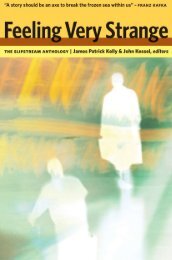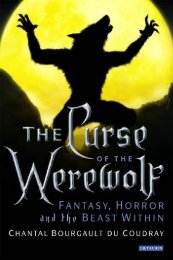A Long Way From Home.pdf - Site de Thomas - Free
A Long Way From Home.pdf - Site de Thomas - Free
A Long Way From Home.pdf - Site de Thomas - Free
- TAGS
- site
- thomas
- zogwarg.free.fr
You also want an ePaper? Increase the reach of your titles
YUMPU automatically turns print PDFs into web optimized ePapers that Google loves.
introduction • xxxv<br />
Notes<br />
1. I borrow the term “rebel sojourner” from the subtitle of what is still the <strong>de</strong>finitive<br />
biography of McKay, <strong>Way</strong>ne F. Cooper’s Clau<strong>de</strong> McKay: Rebel Sojourner in the<br />
Harlem Renaissance (Baton Rouge and London: Louisiana State University Press,<br />
1987).<br />
2. For the historical prevalence of black international writing, see Wendy W. Walters,<br />
At <strong>Home</strong> in Diaspora: Black International Writing (Minneapolis: University of<br />
Minnesota Press, 2005). But Walters focuses on Chester Himes, Michelle Cliff,<br />
Caryl Phillips, Simon Njami, and Richard Wright while hardly focusing on<br />
Clau<strong>de</strong> McKay.<br />
3. Although a literary critic would usually talk about the narrative of A <strong>Long</strong> <strong>Way</strong><br />
from <strong>Home</strong> in the present tense of literary criticism, I talk about it instead in the<br />
past tense. Here and there I use historical markers in or<strong>de</strong>r to synchronize the narrative<br />
chronology with the biographical and historical chronologies for the benefit<br />
of rea<strong>de</strong>rs, even though in certain places there are discrepancies between<br />
McKay’s autobiographical rendition of his life and biographical and historical<br />
facts.<br />
4. Scholars who have focused on this issue inclu<strong>de</strong> Anthony Dawahare, Nationalism,<br />
Marxism, and African American Literature between the Wars: A New Pandora’s Box<br />
(Jackson: University Press of Mississippi, 2003); William J. Maxwell, New Negro,<br />
Old Left: African-American Writing and Communism between the Wars (New York:<br />
Columbia University Press, 1999); James E. Smethurst, The New Red Negro: The<br />
Literary Left and African American Poetry, 1930–1946 (New York: Oxford University<br />
Press, 1999); and Alan M. Wald, Exiles from a Future Time: The Forging of the<br />
Mid-Twentieth-Century Literary Left (Chapel Hill: University of North Carolina<br />
Press, 2002).<br />
5. McKay’s A <strong>Long</strong> <strong>Way</strong> from <strong>Home</strong> exists in the public domain. According to my<br />
research in the Library of Congress’s Copyright Office (specifically, the office containing<br />
archives of copyright renewal paperwork), the original claimant of the<br />
copyright of A <strong>Long</strong> <strong>Way</strong> from <strong>Home</strong> in March 1937 was Lee Furman, Inc., Entry<br />
#103903. In the twenty-eighth year after its publication (or in the year 1965), no<br />
renewal was recor<strong>de</strong>d, and thus the book is in the public domain.<br />
6. According to Cooper, McKay was reading and writing political material in<br />
Jamaican newspapers, and in the United States, while enrolled at Kansas State<br />
College from fall 1912 through spring 1914, he began his personal involvement<br />
with radical politics. See Cooper, Clau<strong>de</strong> McKay, 18–49, 68.<br />
7. Note that asi<strong>de</strong> from a passing reference to a “beloved teacher at Tuskegee” late in<br />
the A <strong>Long</strong> <strong>Way</strong> from <strong>Home</strong> (chapter 23), McKay does not discuss his enrollment





